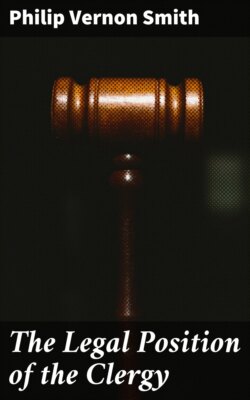Читать книгу The Legal Position of the Clergy - Philip Vernon Smith - Страница 15
На сайте Литреса книга снята с продажи.
Оглавление9. All rectories, vicarages, and perpetual curacies, whether ancient or established under the Church Building and New Parishes Acts, or under any special Act of Parliament, fall within the term benefice, and are of freehold tenure. The term is also applied to non-parochial ecclesiastical offices of a like tenure, such as a deanery, canonry, and archdeaconry. But in the present treatise, which deals only with the parochial clergy, it will be used exclusively of the above-named parochial benefices (which are in popular language called livings); and the clergy who hold these benefices will be called beneficed clergy or incumbents. The other parochial clergy will be referred to as unbeneficed clergy or curates. The legal position of the unbeneficed clergy as regards status and property is so different from that of incumbents that it will be convenient to treat of them separately. But the spiritual duties of the two classes, and the discipline to which they are amenable, are similar and can be discussed together. They are alike subject to the same superior ecclesiastical officials and to the same judicial proceedings; and their civil privileges and disabilities in respect of their clerical office are identical. By virtue of their position as parochial clergy they are brought into certain relations with the bishop of the diocese, the archdeacon of the archdeaconry, and the rural dean of the deanery in which their parish is situate.
